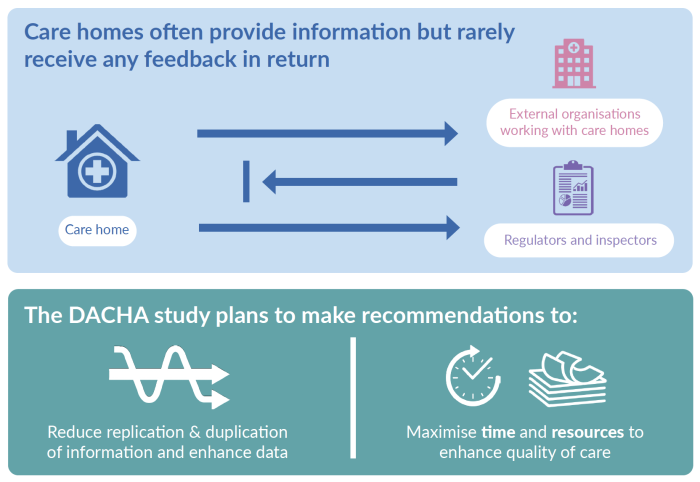In this blog, learn more about the DACHA study by watching an interview with lead investigator, Professor Claire Goodman providing an overview of the project's developments.
In addition, view an infographic showing how care home data is currently collected, stored and used in multiple places to inform quality of care and what the DACHA study plans to recommend.
The £2.2million NIHR funded DACHA study to develop research resources and minimum data set for care homes’ is an ARC East of England supported study being led by the University of Hertfordshire with representatives from 7 other NIHR ARCs.
The objectives of the study are split into two priorities:
- improve research in care homes
- develop a prototype minimum dataset
In the last ten years research in and with care homes has increased in recognition of the complex health and social care needs of this population. Care homes, visiting clinicians, commissioners and regulators collect information about residents, needs, preferences, and care. However, there is no consistent approach across organisations as to how this information is organised, managed and shared. The study is investigating ways to reduce the constant demands on care homes to supply information and to form a standardised approach to collecting data to ensure it is better linked so care homes aren’t unnecessarily burdened with requests for data.
The DACHA study: An overview with Lead Investigator, Professor Claire Goodman
In this video below, learn more about why the DACHA study was created, who they are collaborating with and the study’s developments with implementing policy with the Department of Health and Social Care and with NHS England and Improvement.
There has been a real gear change... this study is very of the moment, trying to keep up to make sure that we fit with policy initiatives, but also making sure the policy initiatives have access to our findings.
Claire Goodman, Professor of Health Care Research and Lead Investigator for DACHA
Where is information recorded when a person in an English care home falls?
Data about people living and dying in care homes are collected, stored and used in multiple places to inform quality of care. However, the same information is often re-recorded in different ways, by various organisations, and there is limited sharing between them - which can be costly on time and resources. View the infographic below to find out more.

Preview of infographic 2022
End notes:
- For more information, visit the DACHA study website here: http://dachastudy.com
- This study is part of the Ageing & Multi-Morbidity theme. View other projects from this theme here.
- For questions about this blog, please email ARCoffice@cpft.nhs.uk